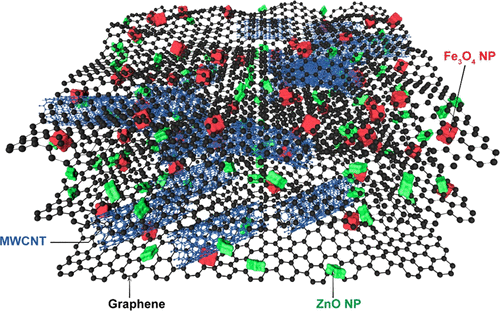
Research Interests
For Dr. Navid Rabiee, science is a calling—a relentless pursuit driven by passion and vision. Each project serves as a testament to his commitment to pushing the boundaries of what’s possible, from revolutionary CRISPR delivery systems and green biomaterials to pioneering diagnostic tools and transformative medical devices. These innovations are more than mere advancements; they represent steps toward a future where science heals, protects, and elevates humanity.
Gene Editing

Dr. Rabiee’s work in gene editing focuses on advancing CRISPR delivery systems through a unique blend of bioinorganic chemistry and nanotechnology. By utilizing inorganic nano-vectors and metal-organic frameworks (MOFs), he is developing precise and efficient gene delivery methods aimed at tackling complex diseases, including neurodegenerative and genetic disorders. His innovations emphasize safety, targeting accuracy, and therapeutic effectiveness, pushing the frontier of personalized medicine closer to addressing previously untreatable conditions.
Early Diagnosis of Diseases

Dr. Rabiee is committed to pioneering methods for the early diagnosis of diseases, with a particular emphasis on cancer and neurodegenerative disorders. His research focuses on developing innovative porous nanomaterials and advanced biosensors capable of detecting disease-specific biomarkers with exceptional sensitivity and specificity. By integrating principles of bioinorganic chemistry and nanotechnology, he aims to create cutting-edge diagnostic tools that facilitate timely interventions for cancer, Alzheimer’s disease, and other critical conditions. Dr. Rabiee's work aspires to revolutionize early detection methods, ultimately enhancing patient outcomes and promoting proactive healthcare solutions in the battle against disease.
Wearable Devices

Dr. Rabiee is at the forefront of developing innovative wearable devices designed to enhance health monitoring and patient care. His research focuses on creating smart, biosensor-integrated wearables that provide real-time data on vital signs, biomarker levels, and other health indicators. By merging principles of bioengineering and nanotechnology, he aims to develop devices that not only empower individuals to take control of their health but also facilitate early disease detection and personalized treatment. Dr. Rabiee’s work in this field aspires to transform healthcare delivery, making monitoring more accessible, efficient, and impactful for patients around the globe.
Targeted Drug Delivery

Dr. Rabiee is at the cutting edge of targeted drug delivery research, focusing on the development of sophisticated nanocarrier systems that improve the precision of therapeutic interventions. His work explores the formulation of inorganic nano-carriers (metal-organic frameworks (MOFs), MXene, composites) tailored for the site-specific release of drugs, allowing for enhanced therapeutic efficacy while minimizing systemic side effects. Utilizing advanced surface modification techniques, Dr. Rabiee engineers these carriers to target specific cellular receptors and biomarkers associated with diseases such as cancer and neurodegenerative disorders. By optimizing the pharmacodynamics and pharmacokinetics of these delivery systems, his research aims to facilitate more effective treatment modalities that align with the principles of personalized medicine. Through these innovations, Dr. Rabiee is committed to transforming the landscape of drug delivery and improving patient outcomes.
Green Biomaterials and Sustainable Chemistry

Dr. Rabiee is a leader in the field of green biomaterials and sustainable chemistry, focusing on the development of eco-friendly materials and processes that align with principles of sustainability. His research emphasizes the synthesis of porous (in)organic nanomaterials using high-gravity methods that adhere to green chemistry principles, significantly reducing environmental impact while enhancing material performance. By exploring renewable resources and innovative processing techniques, Dr. Rabiee aims to create biomaterials that not only serve critical biomedical applications but also contribute to a circular economy. His work encompasses the design and characterization of these materials for applications in drug delivery, tissue engineering, and environmental remediation. Through his commitment to sustainable practices, Dr. Rabiee seeks to advance the development of materials that are both effective and environmentally responsible, fostering a healthier planet for future generations.
Advanced Porous Nanomaterials

Dr. Rabiee is at the forefront of research into advanced porous nanomaterials, particularly focusing on the design and synthesis of metal-organic frameworks (MOFs), MXenes, and their composite materials. His work involves creating nanomaterials with high surface areas and tunable porosity, enabling them to exhibit exceptional performance in various applications, including drug delivery, biosensing, and environmental remediation. Dr. Rabiee’s research delves into the intricate interactions between these porous nanomaterials and biological systems. By investigating the adsorption mechanisms of biomolecules and therapeutic agents, he aims to optimize the release profiles of drugs and enhance the sensitivity of biosensors. The incorporation of MXenes into MOF structures has proven particularly advantageous, as their unique electrical conductivity and surface chemistry can facilitate rapid electron transfer and improve the overall performance of the resulting composites. The synergistic properties of MOF-MXene composites enable enhanced functionality, such as increased loading capacity for therapeutics and improved selectivity in detecting specific biomarkers. By leveraging the unique characteristics of these materials, Dr. Rabiee seeks to advance the development of targeted drug delivery systems that can achieve localized therapeutic effects while minimizing off-target interactions. In addition to biomedical applications, Dr. Rabiee is exploring the use of advanced porous nanomaterials for environmental applications, such as capturing and degrading pollutants. By fine-tuning the porosity and functional groups of MOFs and their composites, he aims to enhance their ability to selectively adsorb harmful substances, contributing to effective water treatment and air purification strategies. Through his commitment to interdisciplinary research, Dr. Rabiee is pushing the boundaries of material science to develop advanced porous nanomaterials that not only address pressing challenges in healthcare and environmental sustainability but also align with principles of green chemistry and sustainable development.